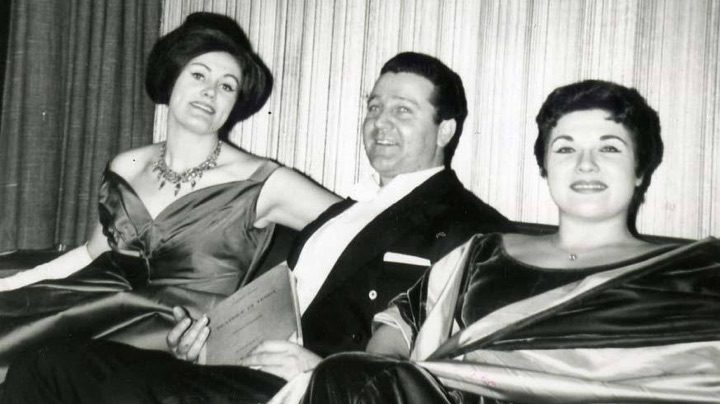
AOS’s starry cast for Beatrice di Tenda: Joan Sutherland, Enzo Sordello and Marilyn Horne.
My endeavor remains a work-in-progress, but as I’d reached one endpoint, I asked La Cieca if she would be willing to host the result and she agreed.
Founded in 1950 by two men in their mid-20s—Allen Sven Oxenburg (1927-1992) and Arnold Gamson (1926-2018)—AOS began small and old with a Monteverdi performance in a Manhattan apartment for an audience of 50. Soon it would be presenting full seasons at Town Hall, the Metropolitan Museum of Art, the Brooklyn Academy of Music, or Carnegie Hall in addition to performances in Philadelphia.
The gap in New York City’s concert opera scene created by AOS’s demise in 1970 was almost immediately filled by Eve Queler and Opera Orchestra of New York.
Happily, OONY’s Wikipedia page contains a complete listing of all its operas and casts, but I’ve long felt that AOS deserved its own such annals, but I’d never imagined that I might be the one to tackle it until this past summer.
While I was investigating Anita Cerquetti’s US career for Trove Thursday, I consulted Frank Hamilton’s enormously ambitious annals of operas performed in Philadelphia. For my quest, I downloaded the section covering 1950-1975 which runs to 375 pages!
What a fascinating document!
As I was searching for Cerquetti’s Norma and Il Trovatore, I came across AOS performances I’d never heard of including Monteverdi’s L’Incoronazione di Poppea with Leontyne Price (!) and Robert Rounseville; Poulenc’s La Voix Humaine and Les Mamelles de Tirésias featuring Denise Duval in the roles she’d created: Hilde Gueden as Gräfin Mariza and Virginia Zeani’s Cleopatra (which I’d later learn only happened in Philly, not NYC where the role was taken a month earlier by Elisabeth Schwarzkopf).
There were other more familiar items but I was intrigued enough to start an informal list on a yellow legal pad. It became the raw beginning of the near-complete chronology that I’m making available today. This post includes AOS’s repertoire season-by-season while a second, much more detailed archive available will feature casts, conductors and the date of the initial New York City performance (there were sometimes previews as well as repeats).
The AOS evening familiar to nearly everyone would be Il Pirata with Maria Callas performed on January 27, 1959 at Carnegie Hall. After Rudolf Bing dropped the diva from the Met’s new Macbeth set to premiere on February 5, Oxenburg invited Callas to appear with his company during that now-empty spot in her schedule. Many will know the early in-house recording which preserved that singular event.
Later that same year came another significant event: over two evenings AOS presented the first complete US performance of Berlioz’s Les Troyens. Sir Thomas Beecham should have conducted but he withdrew and was replaced by Robert Lawrence who would lead his own concert-opera enterprise, the Friends of French Opera.Readers may decry several shortcomings of my work at this point. All along I should have been keeping more extensive notes about all the many premieres, debuts, cancellations and substitutions. If I move ahead with this project, that information will be added to master list which will remain easily accessible.
However, here is some indication of how essential the company was in introducing singers of that era to local audiences. This list includes just some of the artists who made their first NYC opera appearance with the American Opera Society.
Luigi Alva
Gabriel Bacquier
Janet Baker
Teresa Berganza
Walter Berry
Ernest Blanc
Inge Borkh
Montserrat Caballé
Anita Cerquetti
Denise Duval
Eileen Farrell
Dietrich Fischer-Dieskau
Andrea Guiot
Angeles Gulin
Marilyn Horne
Teresa Kubiak
Richard Lewis
Ilva Ligabue
Johanna Meier
Russell Oberlin
Leontyne Price (post-Porgy and Bess, that is)
Elisabeth Schwarzkopf
Giulietta Simionato
Elena Souliotis
Joan Sutherland
Alain Vanzo
Jon Vickers
Of these perhaps Caballé’s unheralded star-making 1965 Lucrezia Borgia debut is the best known.
Although at least one of the Society’s performances was broadcast, many, although far from all, survive thanks to the efforts of bootleggers. As far as I know no complete recording exits of the 1956 Giulio Cesare thus depriving us of Cesare Siepi in the title role and countertenor Russell Oberlin as Sesto, but we do have bits of Price’s Cleopatra.During my research I was shocked to come across one pirate I’d never seen listed anywhere before. In 1964 AOS presented the US premiere of Busoni’s Doktor Faust with Fischer-Dieskau, George Shirley and Ingrid Bjoner. It was led by Jascha Horenstein, that Ukrainian-born conductor who has garnered somewhat of a cult following since his death in 1973. A complete recording of this important event has been uploaded to an all-Horenstein YouTube channel!My fascination with opera-in-concert began long before I attended one: the first was Rameau’s Les Boréades starring Ruth Welting presented in March 1982 by Opera Rediviva at Town Hall, venue of many AOS triumphs. Always drawn to unusual or obscure works, I’d acquired many pirate recordings of AOS and OONY performances and some have already appeared on Trove Thursday. Tomorrow will bring another AOS specialty, followed by several others in coming months.In the meantime, these American Opera Society performances are already available on past Trove Thursdays:
Medea (1955)
Hercules (1960)
Hérodiade (1963)
Alzira (1968)
Orfeo ed Euridice — Haydn (1968)
La Straniera (1969)
Here are all but one of the works AOS presented:
AMERICAN OPERA SOCIETY 1951-1970
1951/52
Monteverdi: L’Incoronazione di Poppea or Il Combattimento di Tancredi e Clorinda (sources differ)
Gluck: Le Cadi Dupé & Monteverdi: Il Combattimento di Tancredi e Clorinda
1952-53
Rousseau: Le Devin du Village & Purcell: The Witch of Endor
Monteverdi: L’Incoronazione di Poppea
1953-54
Gluck: Paride ed Elena
Rossini: La Gazza Ladra
Purcell: Dido and Aeneas & The Witch of Endor
Monteverdi: L’Incoronazione di Poppea
1954-55
Rossini: Otello
Bellini: La Sonnambula
Gluck: Iphigénie en Tauride
Monteverdi: L’Incoronazione di Poppea
1955-56
Cherubini: Medea
Purcell: Dido and Aeneas & Monteverdi: Il Combattimento di Tancredi e Clorinda
Bellini: I Puritani
Offenbach: La Périchole
1956-57
Handel: Giulio Cesare
Cherubini: Medea
Beethoven: Fidelio
Poulenc: Les Mamelles de Tirésias & Falla: El Retablo de Maese Pedro
1957-58
Donizetti: Anna Bolena
Gluck: Paride ed Elena
Rossini: Otello
Offenbach: La Grande-duchesse de Gérolstein
Monteverdi: L’Incoronazione di Poppea
1958-59
Bellini: I Capuleti ed I Montecchi
Rossini: Mosè in Egitto
Handel: Giulio Cesare
Bellini: Il Pirata
Cherubini: Medea
1959-60
Donizetti: Il Duca d’Alba
Offenbach: La Grande-duchesse de Gérolstein
Berlioz: Les Troyens
Gluck: Orfeo ed Euridice
Poulenc: La Voix Humaine & Les Mamelles de Tirésias
1960-61
Handel: Hercules
Monteverdi: L’Incoronazione di Poppea
Bellini: Beatrice di Tenda
1961-62
Bellini: La Sonnambula
Gluck: Iphigénie en Tauride
Handel: Samson
Lehar: Die Lustige Witwe
Rossini: La Cenerentola
1962-63
Stravinsky: The Rake\s Progress
Rossini: L’Italiana in Algeri
Donizetti: Maria di Rohan
Kalman: Gräfin Mariza
Bellini: I Puritani
1963-64
Massenet: Hérodiade
Poulenc: Dialogues des Carmélites
Rossini: Semiramide
Thomson: The Mother of Us All
Bellini: I Capuleti ed I Montecchi
1964-65
Busoni: Doktor Faust
Handel: Alcina
Rossini: Il Turco in Italia
Gluck: Iphigénie en Aulide
Donizetti: Lucrezia Borgia
1965-66
Donizetti: Roberto Devereux
Britten: Billy Budd
Boito: Mefistofele
Verdi: Giovanna d’Arco
Bellini: Il Pirata
1966-67
Rossini: Mosè in Egitto
Donizetti: Anna Bolena
Cherubini: Medea
Handel: Giulio Cesare
Gluck: Orfeo ed Euridice
1967-68
Bellini: Norma
Donizetti: Maria Stuarda
Verdi: Alzira
Haydn: Orfeo ed Euridice
Catalani: La Wally
1968-69
Verdi: Nabucco
Bellini: La Straniera
D’Albert: Tiefland
Meyerbeer: Les Huguenots
1969-70
Donizetti: La Fille du Régiment
Goldmark: Die Königin von Saba
[An ad in OPERA magazine lists Holst’s one-act Savitri as an opera that AOS had performed but I’ve been unable to locate a mention of it.]
There is undoubtedly more to say about the nearly 20 years of American Society which financial problems forced to shut down in 1970 after presenting Goldmark’s Die Königin von Saba!
As I’m not historian, I’m currently undecided if I want to delve any further into this topic but I hope to include some of my random discoveries on Trove Thursday. Reading AOS reviews has been lots of fun. For example, Harold Schonberg in The New York Times commenting on Gabriel Bacquier’s US debut found the 37-year-old French baritone was already a “veteran singer whose voice had seen better days.” Bacquier, of course, would continue at the top of his profession for more than 30 years!
Check in tomorrow when the weekly Trove Thursday podcast will present a truly “grand” introduction to the AOS concert experience!



